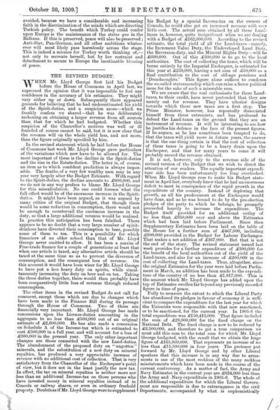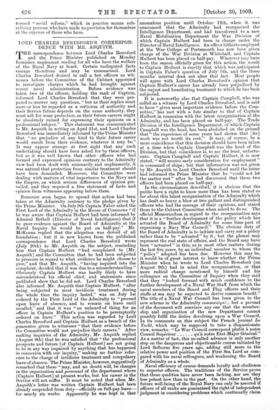expressed the opinion that it was impossible to feel any
We are aware that the real enthusiasts for these Land- confidence in the accuracy of his estimates. They might taxes, to their credit, have never pretended that they are vary either up or down. Subsequently there appeared merely out for revenue. They have ulterior designs grounds for believing that he had underestimated his yield towards which these new taxes are a first step. The of the Spirit-duties, and. a suspicion arose—which we Prime Minister, however, has repeatedly dissociated frankly confess we shared—that he was deliberately reckoning on obtaini g a larger revenue from all sources defend the Land-taxes on the ground that they are an than that for which he had budgeted. Whether this instrument of revenue. It will be interesting to see how suspicion of the Chancellor's motives was well or ill he justifies his defence in the face of the present figures. founded of course cannot be said, but it is now clear that If he argues, as he has sometimes been tempted to do, the revenue will on the whole yield less, and not more, that the taxes will yield more in future years, the answer than the figure originally specified by him. is that the one thing certain is that the cost of collection • of Commons last week Mr. Lloyd George gave particulars Exchequer, and that for many years to come it will of the variations which now have to be allowed for. The probably exceed the revenue obtained. most important of these is the decline in the Spirit-duties It is not, however, only to the revenue side of the and the rise in the Estate-duties. The latter is, of course, revised version of the Budget that we wish to direct the • an item as to which confident prediction is always impos- attention of our readers. The equally important expendi- sible. The deaths of a very few wealthy men may in any tare side has been unfortunately too long overlooked. year very largely alter the Budget Estimate. With regard When Mr. Lloyd George rose to make his Budget state- to the Spirit-duties, the decline amounts to £800,000, and meat in April last, everybody knew that he had an enormous , we do not in any way profess to blame Mr. Lloyd George deficit to meet in consequence of the rapid growth in the for this miscalculation. No one could foresee what the expenditure of the country. Instead of deploring that full effect would be of the enormous increase in the Spirit- growth, as all his predecessors at the Exchequer would dutics. - It might have been argued, as it was argued by have done, and as he was bound to do by the pre-election • many critics of the original Budget, that though there pledges of the party to which he belongs, he promptly would be some reduction in consumption, there would not proceeded heavily to increase the expenditure. The be enough to countervail the enormous increase in the Budget itself provided for an additional outlay of duty, so that a large additional revenue would be realised, no less than .R950,000 over and above the Estimates In practice this anticipation has been falsified. There which had been laid before Parliament. Since then appears to be no doubt that a very large number of spirit- Supplementary Estimates have been laid. on the table of drinkers have diverted their consumption to beer, possibly the House for a further sum of £467,000, including some of them to tea. This is a possibility for which £100,000 provided in the Budget for Labour Exchanges. financiers of an older school than that of Mr. Lloyd That makes a net addition of £367,000. But that is not George never omitted to allow. It has been a maxim of the end of the story. The revised statement issued last Free-trade finance for a couple of generations at least that week provides for a further expenditure of £300,000 for when one article is taxed, any alternative article should be the benefit of the local authorities out of the .yield of the taxed. at the same time so as to prevent the diversion of Land-taxes, and also for an increase of £200,000 in the consumption, and the consequent loss of revenue. On cost of collecting the Land-taxes. Thus, altogether, since this account it would have been wiser for Mr. Lloyd George the original Estimates for the year were laid before Parlia- to have put a less heavy duty on spirits, while simul- meat in March, an addition has been made to the expend i- taneously increasing the duty on beer and on tea. Taking ture of the country of no less than £1,817,000. This is the three duties together, there would then probably have the amount which Mr. Lloyd George has added upon the been comparatively little loss of revenue through reduced. top of Estimates swollen far beyond any previously recorded • consumption. figure in time of peace.
• cost £500,000 in a full year, and will account for a loss of must add this sum to the total sum for which Mr. Lloyd • £300,000 in the present year. The only other important George budgeted, with the result that we obtain the huge - changes are those connected with the new Land-duties. figure of £165,969,000. That represents an increase of no The abandonment of the proposed duty on " ungotten " less than £15,500,000 in four years. The pretence put minerals, and the substitution of a new duty on mineral forward by Mr. Lloyd George and by other Liberal royalties, has produced. a very appreciable increase of speakers that this increase is in any way due to arma- revenue with no additional cost of collection. That is very ments is one of the most reckless of the many reckless satisfactory from the Chancellor of the Exchequer's point misstatements which have been made in the course of the of view, but it does not in the least justify the new tax. current controversy. As a matter of fact, the Army and In effect, the tax on mineral royalties is neither more nor Navy Estimates in the current year are £624,000 less than 'less than an additional Income-tax on those persons who the Army and Navy expenditure in 1905-6. The whole of have invested money in mineral royalties instead of in the additional expenditure for which the Liberal Govern- Consols or railway shares, or even in ordinary freehold meat are responsible is due to extravagance in the civil property. Doubtless if Mr. Lloyd George were to supplement Departments, accompanied. by what is euphemistically avoided, because we have a' considerable and increasing his Budget by a special Income-tax on the owners of faith in the discrimination.of the minds which are directing Consols, he could also get an increased revenue with very Turkish policy. The benefit which Turkey could. confer little cost. The actual sum obtained by all these Land- upon Europe is the- maintenance of the status quo in the taxes is, however,. quite 'insignificant when we are dealing Balkans. If this is preserved, peace will also be preserved. ; with a Budget of X162,000,000. According to the revised Anti-Slav, Pan-German, and. all other ambitions whatso- estimate, the total yield of all the Land-taxes—namely, ever will most likely pass harmlessly across the stage. the Increment Value Duty, the Undeveloped Land Duty, This is indeed a mission for Turkey worth thinking of,— the Reversion-duty, and the Mineral Rights Duty—will be not only to recreate herself, but by her restraint and. £600,000. Out of this £300,000 is to go to the local detachment to secure to Europe the inestimable blessing authorities. The cost of collecting the taxes, which will be of peace. borne entirely by the Imperial Exchequer, is estimated for this year at £259,000, leaving a net sum of £50,000 as a .111..S, REVISED BUDGET. final contribution to the cost of old-age pensions and Dreadnoughts.' This figure alone • suffices to condemn -wHEN Mr. Lloyd George first laid his Budget the so-called statesmanship which can raise a fierce political before the House of Commons in April last, we issue for the sake of such a miserable sum.
himself from these extremists, and has professed to In the revised statement which he laid before the House of these taxes is going to be a heavy drain upon the The other items in the revised Budget do not call for Fully to measure the extent to which the Liberal Party comment, except those which are due to changes which has abandoned its pledges in favour of economy it is suffi- have been made in the Finance Bill during its passage cient to compare the expenditure for the last year for which through the House of Commons. Two of these are the Unionists were responsible with that now sanctioned, financially very important. Mr. Lloyd George has made or to be sanctioned, for the current year. In 1905-6 the concessions upon the License-duties amounting in the total expenditure was £150,413,000. That figure included aggregate to no less than £500,000 out of an original the sum of £28,000,000 for the fixed charge on the estimate of £2,600,000. He has also made a concession National Debt. The fixed charge is now to be reduced by on Schedule A of the Income-tax which is estimated to .R3,500,000, and therefore to get a true comparison we • cost £500,000 in a full year, and will account for a loss of must add this sum to the total sum for which Mr. Lloyd The abandonment of the proposed duty on " ungotten " less than £15,500,000 in four years. The pretence put minerals, and the substitution of a new duty on mineral forward by Mr. Lloyd George and by other Liberal royalties, has produced. a very appreciable increase of speakers that this increase is in any way due to arma- revenue with no additional cost of collection. That is very ments is one of the most reckless of the many reckless satisfactory from the Chancellor of the Exchequer's point misstatements which have been made in the course of the of view, but it does not in the least justify the new tax. current controversy. As a matter of fact, the Army and In effect, the tax on mineral royalties is neither more nor Navy Estimates in the current year are £624,000 less than Consols or railway shares, or even in ordinary freehold meat are responsible is due to extravagance in the civil property. Doubtless if Mr. Lloyd George were to supplement Departments, accompanied. by what is euphemistically termed "social reform," which in practice means sub- sidising persons who have made no provision for themselves at the expense of those who have.











































 Previous page
Previous page